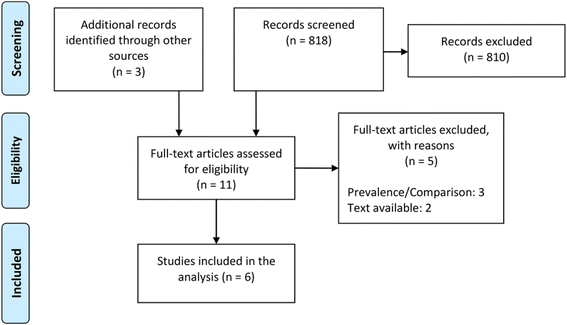Frequency of data extraction errors and methods to increase data extraction quality: a methodological review
- PMID: 29179685
- PMCID: PMC5704562
- DOI: 10.1186/s12874-017-0431-4
Frequency of data extraction errors and methods to increase data extraction quality: a methodological review
Abstract
Background: Our objective was to assess the frequency of data extraction errors and its potential impact on results in systematic reviews. Furthermore, we evaluated the effect of different extraction methods, reviewer characteristics and reviewer training on error rates and results.
Methods: We performed a systematic review of methodological literature in PubMed, Cochrane methodological registry, and by manual searches (12/2016). Studies were selected by two reviewers independently. Data were extracted in standardized tables by one reviewer and verified by a second.
Results: The analysis included six studies; four studies on extraction error frequency, one study comparing different reviewer extraction methods and two studies comparing different reviewer characteristics. We did not find a study on reviewer training. There was a high rate of extraction errors (up to 50%). Errors often had an influence on effect estimates. Different data extraction methods and reviewer characteristics had moderate effect on extraction error rates and effect estimates.
Conclusion: The evidence base for established standards of data extraction seems weak despite the high prevalence of extraction errors. More comparative studies are needed to get deeper insights into the influence of different extraction methods.
Keywords: Accuracy; Data extraction; Errors; Reviewers; Systematic reviews.
Conflict of interest statement
Ethics approval and consent to participate
Not applicable. This work contains no human data.
Consent for publication
All authors reviewed the final manuscript and consented for publication.
Competing interests
The authors declare that they have no competing interests.
Publisher’s Note
Springer Nature remains neutral with regard to jurisdictional claims in published maps and institutional affiliations.
Similar articles
-
Supplemental Screening for Breast Cancer in Women With Dense Breasts: A Systematic Review for the U.S. Preventive Service Task Force [Internet].Rockville (MD): Agency for Healthcare Research and Quality (US); 2016 Jan. Report No.: 14-05201-EF-3. Rockville (MD): Agency for Healthcare Research and Quality (US); 2016 Jan. Report No.: 14-05201-EF-3. PMID: 26866210 Free Books & Documents. Review.
-
Screening for Colorectal Cancer: An Updated Systematic Review [Internet].Rockville (MD): Agency for Healthcare Research and Quality (US); 2008 Oct. Report No.: 08-05-05124-EF-1. Rockville (MD): Agency for Healthcare Research and Quality (US); 2008 Oct. Report No.: 08-05-05124-EF-1. PMID: 20722162 Free Books & Documents. Review.
-
The methodological quality assessment tools for preclinical and clinical studies, systematic review and meta-analysis, and clinical practice guideline: a systematic review.J Evid Based Med. 2015 Feb;8(1):2-10. doi: 10.1111/jebm.12141. J Evid Based Med. 2015. PMID: 25594108 Review.
-
Screening for Skin Cancer in Adults: An Updated Systematic Evidence Review for the U.S. Preventive Services Task Force [Internet].Rockville (MD): Agency for Healthcare Research and Quality (US); 2016 Jul. Report No.: 14-05210-EF-1. Rockville (MD): Agency for Healthcare Research and Quality (US); 2016 Jul. Report No.: 14-05210-EF-1. PMID: 27583318 Free Books & Documents. Review.
-
Lipid Screening in Childhood for Detection of Multifactorial Dyslipidemia: A Systematic Evidence Review for the U.S. Preventive Services Task Force [Internet].Rockville (MD): Agency for Healthcare Research and Quality (US); 2016 Aug. Report No.: 14-05204-EF-1. Rockville (MD): Agency for Healthcare Research and Quality (US); 2016 Aug. Report No.: 14-05204-EF-1. PMID: 27559550 Free Books & Documents. Review.
Cited by
-
Prevalence and concentration of aflatoxin M1 in breast milk in Africa: a meta-analysis and implication for the interface of agriculture and health.Sci Rep. 2024 Jul 18;14(1):16611. doi: 10.1038/s41598-024-59534-1. Sci Rep. 2024. PMID: 39025909 Free PMC article.
-
Patient and Family Engagement in Catheter-Associated Urinary Tract Infection (CAUTI) Prevention: A Systematic Review.Jt Comm J Qual Patient Saf. 2021 Sep;47(9):591-603. doi: 10.1016/j.jcjq.2021.05.009. Epub 2021 May 31. Jt Comm J Qual Patient Saf. 2021. PMID: 34215555 Free PMC article. Review.
-
Data extraction error in pharmaceutical versus non-pharmaceutical interventions for evidence synthesis: Study protocol for a crossover trial.Contemp Clin Trials Commun. 2023 Jul 20;35:101189. doi: 10.1016/j.conctc.2023.101189. eCollection 2023 Oct. Contemp Clin Trials Commun. 2023. PMID: 37520330 Free PMC article.
-
Assessing author willingness to enter study information into structured data templates as part of the manuscript submission process: A pilot study.Heliyon. 2022 Mar 11;8(3):e09095. doi: 10.1016/j.heliyon.2022.e09095. eCollection 2022 Mar. Heliyon. 2022. PMID: 35846467 Free PMC article.
-
Validity of data extraction in acupuncture meta-analysis: a reproducibility study protocol.BMJ Open. 2024 Nov 7;14(11):e088736. doi: 10.1136/bmjopen-2024-088736. BMJ Open. 2024. PMID: 39510790 Free PMC article.
References
-
- Higgins JPT, Green S, editors. Cochrane handbook for systematic reviews of interventions version 5.1.0 [updated March 2011]. The Cochrane Collaboration; 2011. Available from www.cochrane-handbook.org.
-
- Centre for reviews dissemination. CRD's guidance for undertaking reviews in health care. York Publishing Services Ltd. 2009;32:Jg.
-
- Joanna Briggs Institute. Reviewers’ manual: 2011 edition. Adelaide: JBI; 2014.
Publication types
MeSH terms
LinkOut - more resources
Full Text Sources
Other Literature Sources


